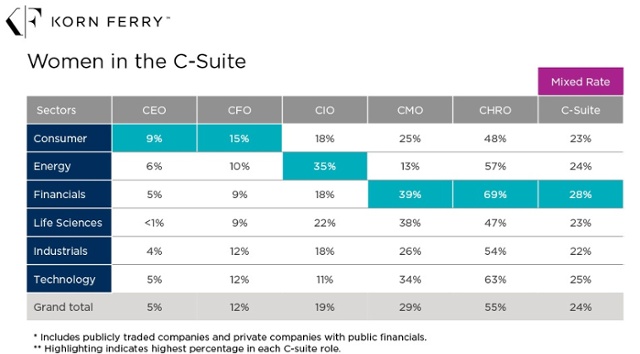 In a recent press release, the following headline and sub-headline were displayed
In a recent press release, the following headline and sub-headline were displayed
Women Rise to Dominate CHRO Roles, But Falter On Path to CEO
Women Now Comprise a Quarter of the C-Suite. According to Just-Released Analytics From Korn Ferry, Most Get There By Holding CHRO Positions. Industry Experts Weigh In On Why This Is Happening and How More Women Can Gain Access
While the headline had a negative focus in regards to female CEO employment it did not place enough emphasis on the very positive fact that 55 percent of CHROs across industries are women.
This ascension to leading to females have more direct paths to being CEO as well as other C-Suite careers.

Korn Ferry recently published an analysis of the top 1,000 U.S. companies and found that women now have a percentage majority position in the CHRO role.
“In our research, we find that women rank higher on key competencies needed in the CHRO role such as collaboration and negotiation skills, the ability to balance multiple constituencies and an appreciation for the dynamics of the overall business,” said Joseph McCabe, vice-chairman in Korn Ferry’s global human resources center of expertise.
It should also be noted that women also represent a significant percentage of senior leaders in Marketing (29% of all positions held).
Why is this important?
- The numbers show that the glass ceiling is being cracked and that women now have at least one leadership role in the top 1,000 organizations across the country.
- The majority percentage of female CHRO’s provides a career path to the CEO role. The Korn Ferry study noted:
“The CHRO, of course, has always played an essential role. But changing times have helped to elevate the position to new heights. Gone are the days when people in this role are seen as the keepers of the administrative people functions.
Today’s effective CHROs are clearly part of the executive teams that develop and execute business strategy. Increasingly, the CHROs that we work with own the talent solution side of the business, aligning talent work streams to drive the business toward the organization’s objectives.
Companies, where the CHRO focuses on this strategic set of responsibilities, are positioned to gain the upper hand because these firms are likely to better execute their strategies.
For all the value that those who occupy the chief human resources officer (CHRO) seat have brought to their companies over the years, it is only now that the role has begun to claim the fullest respect and attention of top leadership.
It’s been a long time coming, say recruiters who hunt for them, but in today’s business climate, in which responding to change and getting off the ball first matters a great deal, CHROs are playing a more critical part in moving their organizations forward.
In a Hunt-Scanlon article that was analyzing the Korn Ferry data, Alan Guarino – Vice Chairman at Korn Ferry, offered some insights on what the study is saying about the future role of the CHRO and the opportunities that this changing role will provide for female leaders
Alan, describe for us how the CHRO role has evolved in recent years?
Gone are the days when people in this role are seen as the keepers of the administrative people functions. Today’s effective CHROs are clearly part of the executive teams that develop and execute business strategy. Increasingly, the CHROs that we work with own the talent solution side of the business, aligning talent work streams to drive the business toward the organization’s objectives. Companies, where the CHRO focuses on this strategic set of responsibilities, are positioned to gain the upper hand because these firms are likely to better execute their strategies.
So why do CHROs have the potential to make great leaders?
Korn Ferry research shows that, while most best-in-class executives reveal a similar silhouette, it is clear that CHROs are cut from the same cloth as CEOs and COOs. It is not a surprise that COOs and CEOs have similar profiles, given that they play similar roles. What is fascinating is that best-in-class CHROs are so much more similar to CEOs than are CFOs, CIOs, or CMOs. Even examining nuanced distinctions, we find that the CHRO’s profile is statistically closer to that of the CEO and COO than are the other key functional leaders.
How do CEOs view the importance of the CHRO position within the overall scope of the how the business performs?
Paying attention to the talent part of the business is critical to success. Total human capital costs can account for as much as 70 percent of operating expenses, including for Fortune 500 companies. To get the most from this investment, organizations need to align their talent strategies and their business objectives. Historically, HR has been very proud of its programs. The focus has been the programs and their component parts and not how they actually drove the successful execution of the business strategy. But today, it’s not about the programs. It’s about workstreams that align talent to the mission. This alignment puts CHROs in a very strategic position and in partnership with the CEO, CFO, chief marketing officers (CMOs), and other C-level leaders.
What can you tell us about the current state of the CEO / CHRO relationship? What’s the balance of power?
Of great importance in the expanded role of the CHRO is acting as a key ally to the CEO. As a trusted advisor, the CHRO can tell the CEO what he or she needs to know: Is the CEO having the intended impact as a leader?
Is the right executive talent in place? Is the culture productive and emerging—or is it in danger of becoming toxic and demoralizing? Without leveraging such deep insights on talent, leadership, and culture, a CEO may find that even exceptional technical solutions are not being implemented—or are being implemented out of sync with rapidly changing global markets.
CHROs who move well beyond merely administering programs create impact and a return on the money invested in their company’s talent systems. It takes courage and a willingness to be proactive; they must anticipate problems before they arise and provide solutions.
As more CHROs step up to the challenges and expectations of broader, more strategic responsibilities, the more the role will evolve into ownership of the talent solutions for executing the organization’s strategies.
![]()



